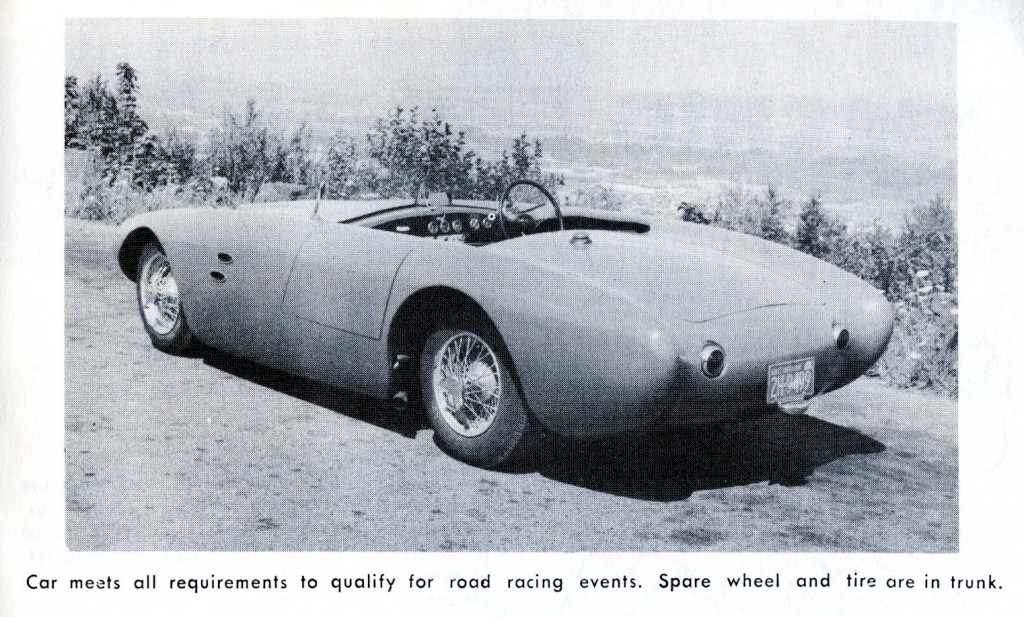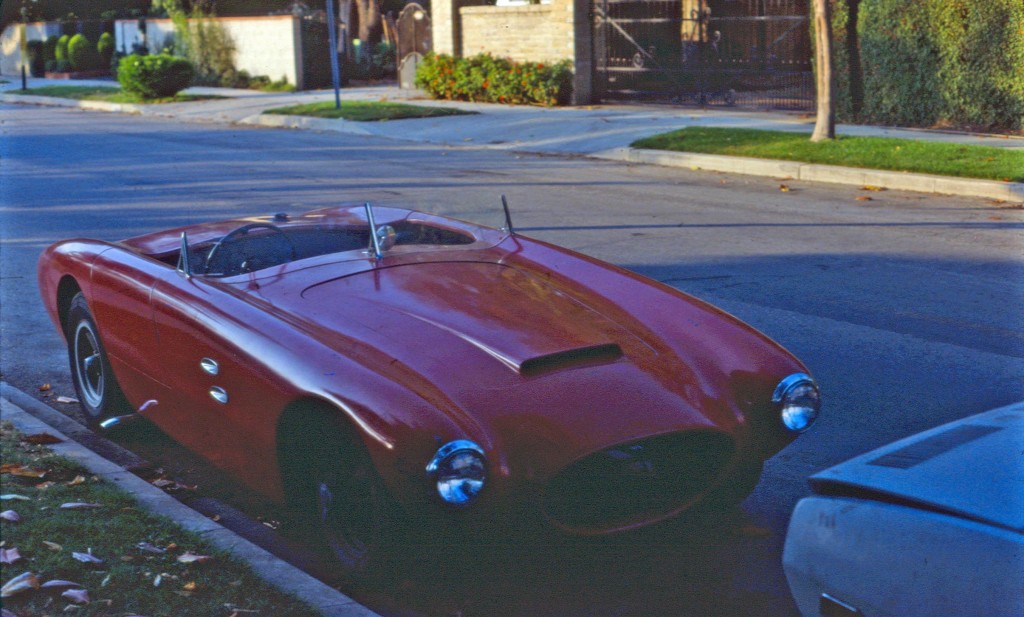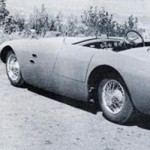
Hi Gang…
I’m feel like I’m the Indiana Jones of vintage automotive magazines – postwar – that is.
That’s how I feel. I didn’t know that was my destiny, but what the heck….if you want the stories and the legends, you have to take the road to mecca. That’s what this journey has felt like these past few years.
I mention from time to time research energy I’ve spent tracking down magazines. Not the easy ones like Road and Track and Motor Trend. Instead, I’ve been pursing the tough ones like “Auto Sportsman”, “Cars & Clubs”, “Sports Car Pictorial”, “West Coast Sports Car Journal”, and now…”Northwest Rods”.
You see…. information about our favorite cars – vintage fiberglass sports cars – is found throughout all magazines in the 1950’s. Rick D’Louhy and I have found over 100 front cover appearances on the 1950’s magazines alone – and we’re still finding more. Click here to review our current listing of vintage magazines showing fiberglass sports cars on their cover.
The fiberglass sports cars were real famous cars back in the day gang – and the magazine publishers knew it and gave them the exposure they deserved.
So of course I started researching magazines – in search of the lost “content”. The creme de la crème – so to speak. If only there was a source of obscure magazine names of the 1950’s. There was – but that’s a different story for a different day.

Caption: One reason for high winding performance of the Chev engine is the Parham “Quad” manifold which lets engine breathe.
The Legend of Northwest Rods Magazine
From time to time I heard about a magazine published in the Northwest called “Northwest Rods” and/or “Northwest Rods and Sports Cars.” Trouble was, I couldn’t find anyone who knew anything about it. I must have searched two years before I found my first copy and information slowly started dribbling in. What I learned was only 4 issues were published, and the first one was the hardest to get. And to boot…this first issue covered some sort of legendary fiberglass sports car.
What torture it was for me to hear that! To me, that would be like hearing that a BMC Singer Special, Vale Wright’s “Vale”, the Savage, and one or two LeMans Coupes were all in the same garage “somewhere” in California. Sheesh! Where would that darn garage be! And where are those issues of Northwest Rods???
For years I searched, and finally last week….I found it on…..”Ebay.” Click on the black triangle below to hear my favorite song about eBay:
So the magazine arrived – two copies of it, no less. Amazing. And what did I find…. The long-lost article of the Larry Eave Meteor. True…I had heard about this car from a different magazine – the November 1957 issue of Sports Cars Illustrated. But in the search for all information “fiberglass”….Rick and I never leave any piece of fiberglass matt unturned.
So let’s dig in and see what the article has to say…
Larry Eave Builds a Bomb
Northwest Rods “Car of the Month”
Northwest Rods: October 1957 (Volume 1, Number 1):

Caption: Car meets all requirements to qualify for road racing events. Spare wheel and tire are in trunk.
One of the finest pieces of automobile engineering to show in the Northwest in many a moon is the Chev-powered Special built by Larry Eave of Portland, Oregon. Larry, with the help of Chuck Rich and Orville Withey, spent the best part of two years stuffing this one together. From its 90 pound tube frame to its torsion bar springs the car is a thoroughbred.
The Chev mill will hustle the scarlet rig down the quarter in just 13 seconds to reach 105 mph. 0-60 takes less than 6 seconds and it will top 140 mph. With its unique suspension system and well nigh perfect weight distribution, the Eave machine is as at home in the corners as it is on the straightaway.

Caption: Cockpit is “Zolotoned.” Bucket seats are from an Anglia. Only necessary instruments are carried in panel. Brake and clutch are swing mounted.
Northwest Rods dedicated 4 pages to this beauty, and the rest of the pages showed pictures with detailed captions – and one full page of specifications. Let’s review the “specifications” of the Larry Eave Meteor:
Eave Special Specifications:
Engine:
- Cylinders: 8, inv., 90 degrees
- Bore and Stroke: 3.750 x 3
- Capacity: 265 cubic inches
- Valves: 1.720” intake, 1.625” exhaust
- Carburetion: 4 Stromberg 97’s
- Ignition: Spalding (centrifugal advance only)
- Plugs: Lodge
- Oil Capacity: 10 quarts
- Cam: Iskenderian Revmaster E-2, Total Lift .410
Clutch:
- Auburn 10″
Gear Box:
- Ford, side shift, Zephyr gears
- Low 2.12:1
- Second: 1.44:1
- Top 1:1
Rear Axle:

Caption: Backbone of car is formed of 4-inch tubing (1/16″ wall). Rear suspension is by torsion bars.
- Halibrand-Ford Quick Change
- Ratios available: 3.33, 3.48, 3.63, 3.78, 3.94, 4.11, 4.30
Wheels:
- 15 inch
- Dayton Quickchange centers
- Pico Rims
Tires:
- Goodyear
- 6.00 x 15 rear
- 5.90 x 15 front
Brakes:
- Front: Bendix 11 x 2.50
- Rear Ford 12 x 1.75
Steering:
- Saginaw – modified pitman
- Turns, lock to lock – 2
Suspension:
- Transverse leaf spring and straight axle – front
- Torsion bars, solid rear axle – rear
- Shock absorbers – 50-50 Houdaille all around
Chassis:
- Wheelbase: 98.5″
- Front track: 54.5″
- Rear track: 52.5″
Overall:

Here’s A Mystery Photo Of The Car That Is Posted On Tams Old Race Car Site. Folks In The Photo Are Unidentified.
- Length: 160″
- Width: 70″
- Height: 36″
- Ground clearance: 4.5″ at oil pan
- Fuel capacity: 30 gallons
- Weight: 2000 lbs
Performance:
- 0-60: 6 seconds
- Top (3.78 gears) Speed: 140 mph
- Standing Quarter (4.11 gears): 105 mph
Summary:
I tracked down the Eave family several years ago in search of additional information about the car. Larry had passed away, but I met with his son Scott and learned a bit more about his father and the car. No additional pictures surfaced, though. Two people I have not searched for were Chuck Rich and Orville Withey. Anyone want to help find these two sports car builders from the 1950’s? I wonder what treasure trove of pictures they might have.

Peter Boyd Last Saw The Car In Los Angeles About 1980. Will You Be The Next Person To Find This Very “Special” Meteor?
As to what happened to the car, tantalizing clues have been found. The best one was a picture sent in by Peter Boyd of the Meteor he owned (or had seen) in the early 1980’s. It was the Eave Meteor. It had made it down from Oregon and was now in Los Angeles, California. Sadly, that was 30+ years ago and it hasn’t been seen since.
So… to all of you West Coast Fiber Fanatics out there….we have 3 tasks before us:
- Find Chuck Rich
- Find Orville Withey
- Find the Eave Meteor
Which of you is up to the task? Martin Rudow….you’re up in the Northwest – do you know Chuck Rich or Orville Withey? Inquiring minds want to know.
Hope you enjoyed the story, and until next time…
Glass on gang…
Geoff
——————————————————————-
Click on the Images Below to View Larger Pictures
——————————————————————-
- Caption: Larry Eave (seated) and Chuck Rich Spent Two Years Putting The Car Together.
- Caption: One reason for high winding performance of the Chev engine is the Parham “Quad” manifold which lets engine breathe.
- Caption: Cockpit is “Zolotoned.” Bucket seats are from an Anglia. Only necessary instruments are carried in panel. Brake and clutch are swing mounted.
- Caption: Car meets all requirements to qualify for road racing events. Spare wheel and tire are in trunk.
- Caption: Backbone of car is formed of 4-inch tubing (1/16″ wall). Rear suspension is by torsion bars.
- Caption: Ford side shift box is adapted to rear of Chev V8.
- Here’s A Mystery Photo Of The Car That Is Posted On Tams Old Race Car Site. Folks In The Photo Are Unidentified.
- Peter Boyd Last Saw The Car In Los Angeles About 1980. Will You Be The Next Person To Find This Very “Special” Meteor?













Was great to see this article about Larry Eave…was such a great person to know. He was a great person in my life…taught me a lot about CHEVROLET…life cut short…John
That was my father’s (Larry Eave) build. I remember the car like it was yesterday, well sort of.
I was quite young when he and his hot rod pals built it, nearly from the ground up. I recall blasting up Rocky Butte on weekend mornings, ah what an intro to automobiles.
It seems to me the color picture reflects a repaint as I recall the Eave Chevy Special being a deep, rich Ferrari red.
As with most things Dad built, he kept it a very short-while before selling it, his motivation was in the dreaming and building, not so much the driving. Funny as he became a regional SCCA champion with the 2 Corvettes he worked up after he sold this. They were my Mother’s daily drivers.
He was an engineer and designer at heart, in love with small block Chevy engines, always looking for the way to get them to spin just a little bit faster. It was only after we built a flat bottom drag race boat, that he succumbed to the allure of big block (454) torque and horsepower.
I photographed it in North Hollywood in around 1980 but had seen it often on the Strip near Carlos and Charlies. I’d left a note on it but never heard back. It seemed to have a tweeked small block Chevy and the steering appeared to be Jag.
Eureka! Update Oregon! Charles Robert Rich aka ‘chuck’ is alive and well at age 83 in Cove, Oregon (pop 500). 1- 541- 568-4814. E- mail N7BCW@coveoregon.com Stan
Great stories Geoff keep em coming.
Does anyone recognize that hydraulic slave cylinder attached to the trans?
Glenn
You’re my first comments in our new format! I’m so pleased to have our new feature being used.
Good observation here….yes it’s right hand drive. More about that in a future article about the Eave car…
Best..
Geoff
It was not all that uncommon to build ‘specials’ with RHD in that era. It made them look more foreign. And they are fun to drive, too. One of the more common steering racks back then came from Morris Minors. A LHD Morris rack was often flipped to convert LHD MGs to RHD plus other cars. MG TCs only came as RHD and many were being built into ‘specials’ then, too.
Hi Geoff – Did I miss something here – why was the car built as a righthand drive? Really a nice looking ride – hope someone is able to uncover it.
Glenn Brummer